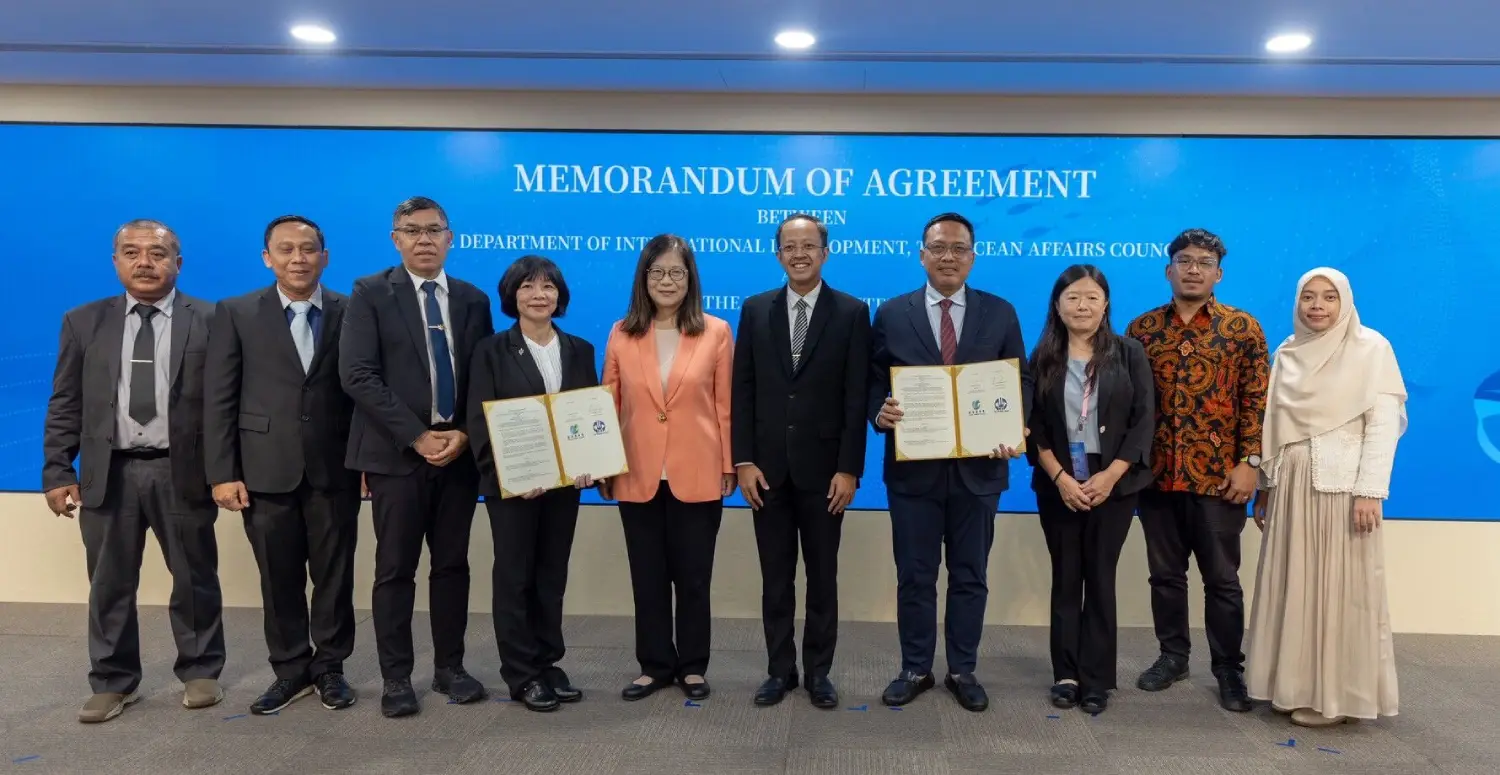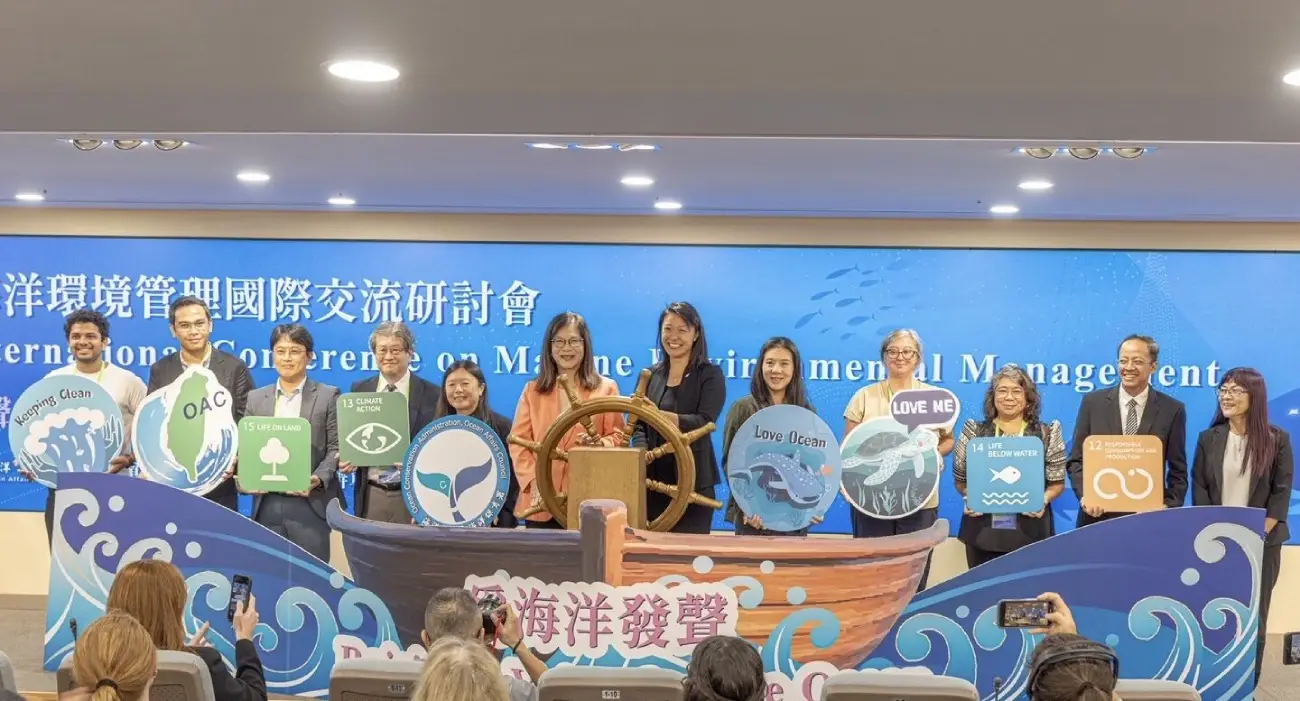New Chapter in Transnational Cooperation as Ocean Affairs Council and Habibie Center Sign MOA on Marine Debris Governance
New Chapter in Transnational Cooperation as Ocean Affairs Council and Habibie Center Sign MOA on Marine Debris Governance

Minister Kuan Bi-ling (fifth from left), Indonesian Representative Andi Muhammad Ghalib Alif (fifth from right), Director-General Shiau-Yun Lu of the Ocean Conservation Administration (third from right), together with the Indonesian delegation.
Taiwan Ocean Affairs Council (OAC) Minister Bi-khim Kuan and Indonesian Representative, Andi Muhammad Ghalib Alif, today (15th) jointly witnessed the signing of the Memorandum of Agreement (MOA) on Indo-Pacific Marine Debris Governance at the 2025 International Conference on Marine Environmental Management.
The agreement marks the establishment of the first institutionalized cooperation between Taiwan and Indonesia's influential independent think tank, The Habibie Center. It is also the first time since its founding that the OAC has signed a cooperation document with an international think tank, representing a significant milestone in advancing Taiwan's "Indo-Pacific Marine Debris Governance Cooperation Platform"
The conference was also attended by representatives from key international institutions, including the U.S. Environmental Protection Agency (EPA), U.S. Coast Guard Pacific Strike Group, Hawaii Pacific University's Center for Marine Debris Research, France's Centre of Documentation, Research and Experimentation on Accidental Water Pollution (CEDRE), Japan's Marine Disaster Prevention Center and Institute for Global Environmental Strategies (IGES), and Korea Fisheries Resources Agency (FIRA).
Indonesia as a Starting Point: Building a Scalable Model for Indo-Pacific Marine Debris Cooperation
As the largest country in Southeast Asia and a core member of ASEAN, Indonesia—home to more than 17,000 islands—faces pressing challenges from marine plastic waste, making effective governance a focal point of both regional and global concern.
The signing of this Memorandum of Agreement follows the establishment of the OAC's Marine Debris Governance Office in Indonesia this past April, and represents a further step forward in strengthening collaboration with The Habibie Center. Widely recognized for its credibility within Indonesian society, The Habibie Center has long been an advocate for cross-border cooperation and sustainable development, positioning it as a key player in driving regional integration and collective action.
Kuan emphasized that marine debris, carried by ocean currents, disperses across borders, making cross-border tracing and effective governance possible only through international cooperation. She noted that Taiwan's offshore islands, including Matsu and Kinmen, continue to be impacted by drifting marine litter. "We have long endeavored—and continue to hope—that neighboring countries will set aside differences and join hands to confront the marine crisis, working together for the greater well-being of all humankind," she stated.

Minister Kuan Bi-ling (fifth from left), Indonesian Representative Andi Muhammad Ghalib Alif (fifth from right), Director-General Shiau-Yun Lu of the Ocean Conservation Administration (third from right), together with the Indonesian delegation.
Pooling Global Expertise: Expanding the Impact of Indo-Pacific Partnerships
Taiwan's efforts to advance the Indo-Pacific Marine Debris Governance Cooperation Platform are gaining momentum. At the conference, representatives from the U.S. EPA shared insights on marine debris management, the "trash free from waters" program, and collaborative practices with the National Oceanic and Atmospheric Administration (NOAA). Taiwan and the United States have also signed a Technical Cooperation Agreement on Establishing Satellite-based Marine Oil Pollution And Marine Debris Monitoring Collaborative Activity, and are currently prioritizing AI-driven cooperation in marine debris monitoring technologies.
At the same time, the Indo-Pacific Marine Debris Governance Cooperation Platform is actively expanding its scope of partnerships. Taiwan has joined forces with the international NGO Environmental Justice Foundation (EJF) to host a workshop in Thailand on abandoned fishing gear, promoting recovery and reuse initiatives. It has also initiated exchanges with Japan's Clean Ocean Material Alliance (CLOMA) to share the latest technologies and models for plastic recycling, and participated in Japan's largest circular economy exhibition to showcase Taiwan's achievements in marine debris governance and circular economy practices. These initiatives underscore Taiwan's growing role in fostering global collaboration and enhancing its visibility and impact within the international community.
The OAC reaffirmed that by expanding cross-sectoral partnerships and strengthening exchanges with the U.S. EPA, Taiwan will deepen its international engagement and leverage its expertise to work alongside Indo-Pacific partners in advancing marine environmental governance. These collective efforts aim to contribute tangible progress toward the shared vision of a "Plastic-Free Ocean and a Sustainable Indo-Pacific."
